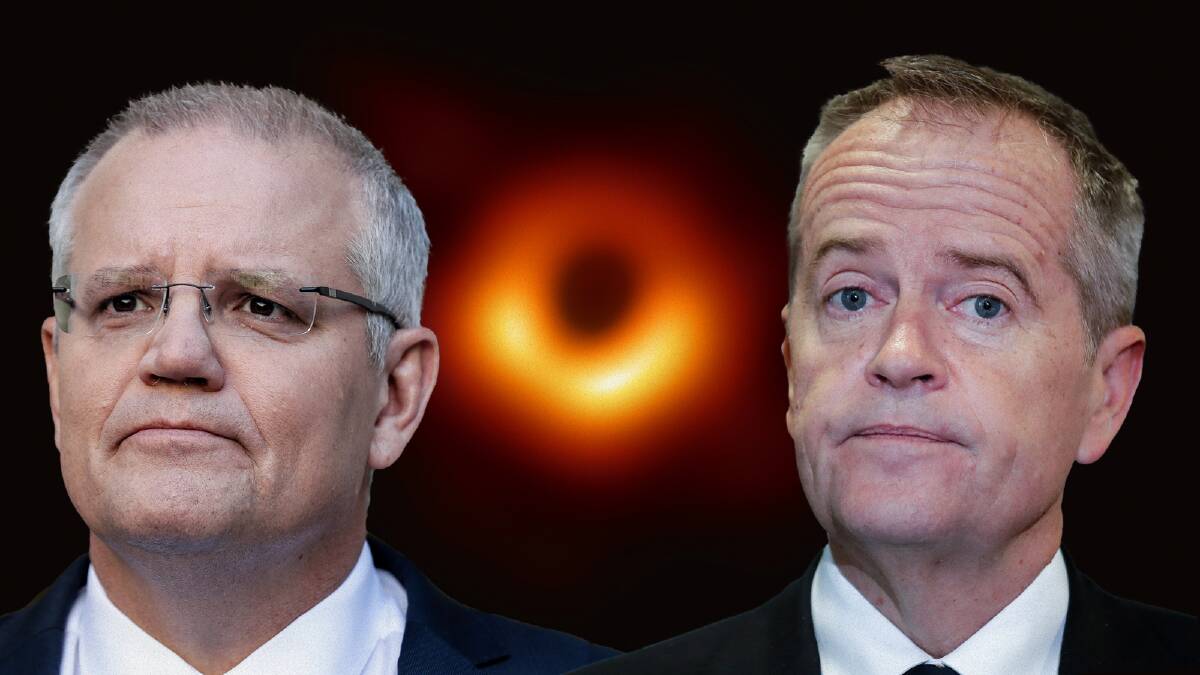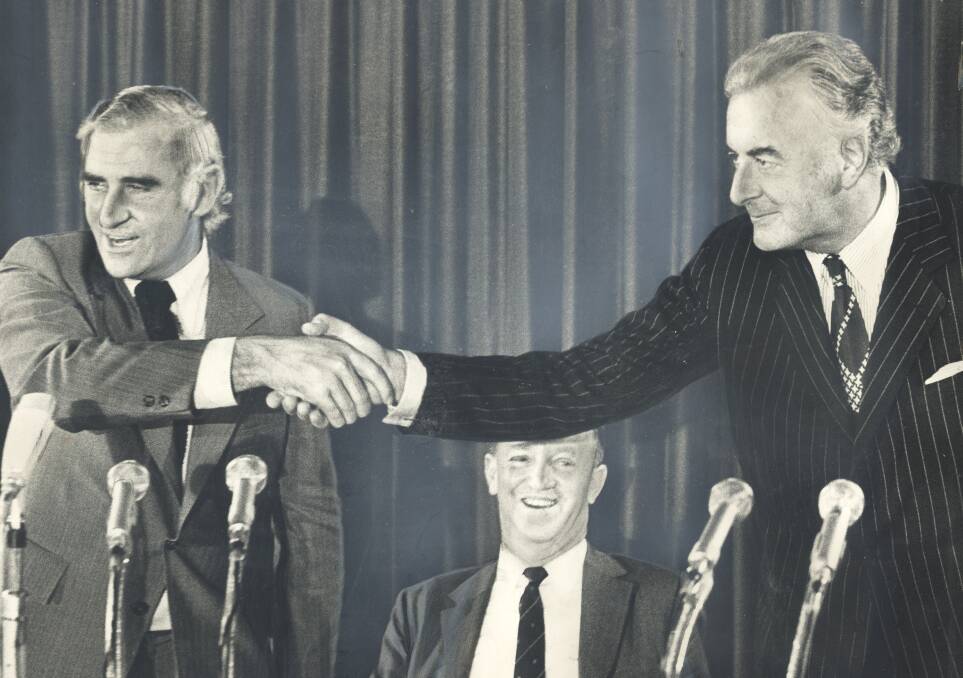Voters have almost a week's respite, because of Easter and Anzac Day, from the resumption of election hostilities. Those few outside the fabled Canberra bubble who have even noticed that an election campaign has been going on for more than a week are no doubt disappointed with the truce; most likely however most of the population has either not noticed the battles or, as yet, failed to become engaged with them. They haven't missed much.
Subscribe now for unlimited access.
$0/
(min cost $0)
or signup to continue reading
It is plain that the Prime Minister, Scott Morrison, will continue to hammer his claim that the Coalition is the better economic manager, and that Labor will sink it with higher taxes. There's an undertone, reminiscent of a Sydney Morning Herald editorial of 1972, recognising a mood for change and sense that the government has been a shambles, but imploring the electorate not to be seduced by the false and showy glitter of the dangerous and incompetent Labor Party.

Labor, by contrast, has an array of themes, including its traditional focus on health, education and social welfare, plus action on climate change, and, on the negative side, the disunity and disorganisation of the Coalition, as well as the sense that it has run out of steam and ideas. Labor is not shrinking from a claim to equal or greater competence at economic management. Although the leader of the opposition, Bill Shorten, is stronger on the rhetoric about his party being a movement, he has so far done little to invest the campaign with any sense of being a crusade, let alone one towards some light on some hill.
While the last fortnight reinforces the idea of the importance of leaders being masters of their briefs and of the detail of their policy proposals, it also suggests that both leaders would be better out of all of the boring detail and more focused on the broader themes.
Insiders relish watching leaders being rattled by an imperfect memory for fine detail, but, absent a GST-on-cake moment, which we are not going to get, I doubt it has much impact on those said to live outside the bubble, in the real world. Most of these appear to have made up their minds about the government at least 18 months ago - before Morrison, whom they scarcely know or recognise - became Prime Minister. The evidence, moreover, is that the result will be a verdict on the Abbott-Turnbull-Morrison-Joyce-McCormack government's performance, not a judgment on Shorten or Labor.
May 18 is the last day that voters could go to the polls with the reasonable certainty that an election for half the Senate could be concluded by June 30. Morrison could have held out much longer for a House of Representatives election, but he could not defer the half-Senate election, and would have looked bad had he decoupled them.
The last time that there was a half-Senate election without a House of Representatives election was in 1970. Whitlam twice scheduled half-Senate elections, only to have events overtake him. There were half-Senate elections without simultaneous lower house elections in 1967 and 1970. The 1974 election would have been to replace the 1967 lot.
So far, the leaders have failed to mobilise, galvanise, enthuse or nourish their followers.
In those days, there were ten senators from each state (none for the territories), and normally, a half-Senate election involved selecting five senators by the Hare-Clark system.
In 1974 the Whitlam government was frustrated by the Senate, in which Labor and the Coalition each had 26 seats. But the Coalition usually had the support of five Democratic Labour Party senators. The Senate rejected the Medibank bills, the Petroleum and Minerals Authority Act and legislation giving the ACT and the Northern Territory two senators each. Labor expected it would improve its position at the 1974 Senate election, but its chance of getting a majority seemed remote.
Whitlam became aware that Vince Gair, a long-term DLP senator from Queensland, was tired of the game and open to blandishments. If he resigned before the writs were issued, it would mean that the election in Queensland - usually very hard going for Labor, would be for six, rather than five senators. Gair was offered and accepted the ambassadorship to Ireland.
Alas, thanks to a great scoop by Laurie Oakes, working for the Melbourne Sun, the plot became known before the old villain had submitted his resignation. Some cunning Country Party senators organised a prawn night, with copious refreshment, for Gair while the Queensland premier, Jo Bjelke-Petersen, laboured to have the Queensland governor issue the writs for a half-Senate election for Queensland. By the time Gair's signature was on the resignation letter, it was too late: the election would be for five senators, and Gair would be replaced until 1976 by the Queensland Parliament.
Whitlam's chicanery was not an attractive look for a party which exuded considerable idealism. But when Billy Snedden, leader of the opposition, announced that his conduct was so wicked that it warranted refusing the government supply, Whitlam did not hesitate. He went immediately to Government House, and asked for, and got, a double dissolution.
It was the election which gave us Medibank - as Medicare was then known. And a gas pipeline to the eastern coast. And senators for the ACT and the Northern Territory.
The 1974 election was the first I reported as a journalist in the press gallery -- the most junior one, thus focused on the nearby elections such as in the ACT, Eden-Monaro and Hume. I was glad to be always close to Canberra, because my then wife was eight months pregnant -- this in the days before mobile phones - indeed when one usually had to wait six months for a landline. (Luckily, my daughter Sarah arrived a week after the second coming.)
Canberra had just been divided into two seats. The Liberal Party persuaded Larry Pickering, cartoonist for The Canberra Times, to stand for one of them, despite the imploring of many of his friends, including myself. He had no chance whatever; indeed he would have needed a swing of about 17 per cent to defeat Ken Fry, the Labor candidate chosen for the new seat of Fraser.
Pickering, well known and popular about Canberra, in part because he was always generous in speaking to Rotary, Probus and other functions, could not see that the odds were so great. He confused first preferences with two-party preferred.
As Pickering came to appreciate the odds against him, he abused voters and other candidates. Kep Enderby, who had held the seat when the ACT had only one seat , was, he said, a lightweight. And "If Kep Enderby is a lightweight, Fry is a flyweight,'' he said. "Why is it that the Labor Party has more informal voters than the Liberal Party? They are a bloody sight stupider, that's why."
Pickering failed to improve the Liberal vote. To a request for a closing comment he said: "You could put an ALP badge on a chimpanzee and the people of Canberra would vote for it.''
Rather more fun was seeing Fred Daly on the hustings in Queanbeyan, a very marginal seat held for Labor by Bob Whan. One night I watched the Country Party candidate, Ron Brewer, stand forlornly in Monaro Street with Ian Sinclair and a crowd of about 10, including six people associated with the campaign, while, 100 yards away Fred Daly was joking to scores about the latest Liberal Party advertisement, featuring youthful pictures of their leaders, and listing ages about three years out of date.
"They jazzed up that old deadbeat Snedden, gave him a haircut, and put a few ads in the paper and said 'look at him'," he said.
"Following Snedden would be as exciting as going into space on a push bike ... He says he is very interested in the young people of today. Don't forget he was one of the ones sending them to Vietnam.
"The Country Party is the greatest collection of political bushrangers in the world today. They have so many names we had to have a double dissolution to get all their names on the ballot paper.''

Labor was pushing health, education and welfare, the unfinished Whitlam agenda, and the beastliness of the Coalition in being outraged at being out of power. Billy Snedden, perhaps mildly more charismatic than Morrison, was focused on economic management, and the risk of the Whitlam experiment taking us to hell in a handcart. One of the Labor campaign slogans was "Oh no, not Snedden".
On May 18, 1974, the Whitlam government was returned, with the loss of one seat, that of Al Grassby in Riverina, who was said to have been targeted by a racist letterbox campaign. Labor won three extra Senate seats, bringing its total to 29 out of 60. The Coalition gained three seats, also to 29.
The DLP was wiped out. It was the first time I heard a politician, in this case Frank McManus of the DLP, say: "today's rooster is tomorrow's feather duster". The new Senate again rejected the double dissolution bills, but they were passed in the only joint sitting of both houses since federation.
Bill Snedden adamantly insisted that he had not lost the election (although he ultimately admitted he had not won it). Afterwards, he was doomed. He didn't see that either, telling journalists that members of his party would walk on hot coals through the valley of death for him: "Everyone recognises my political judgment and, if I say something must be this, it will be. That's why I'm leader.''
Ten days after he said that, Malcolm Fraser moved against him. It was a typical Liberal assassination, with an initially unsuccessful attack by retired firewalkers serving to destabilise the leadership, followed by a coup de grâce a few months later.
Soon, too, a Labor senator, Lionel Murphy, was appointed to the High Court, and a NSW Premier, Tom Field, repudiated the convention that he should be replaced by a Labor nominee, and put in instead the mayor of Albury, Cleaver Bunting.
Then Bertie Milliner, a Queensland Labor senator, died, and Bjelke-Petersen decided that he should be replaced by a Labor man of his choosing, Albert Field. The stage was set for the refusal of the Senate to debate supply in late 1975 and the dismissal of a by-now scandal-ridden Whitlam government.
Whitlam's last official act as prime minister was to recommend a half-Senate election for December 13, 1975. The governor-general did not accept that this would solve the problem and withdrew Whitlam's commission.
And here we are in 2019 facing another May 18 election. Sooner or later, someone will declare that the choice Australians make this election will be the most important of recent times. Maybe, perhaps especially, if it's effectively a vote for further delay on climate-change action. But mere quarrelling over costs is hardly the way to bring to the forefront manifest public dissatisfaction about the way governments are dealing with what a former Labor leader once called the great moral challenge of our time.
So far, the leaders have failed to mobilise, galvanise, enthuse or nourish their followers. Or their enemies. One shouldn't be allowed to bore himself into office. Or to win by default.
Jack Waterford is a former editor of The Canberra Times.


